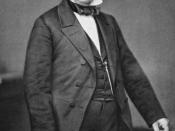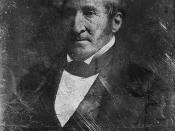The Emergence and Development of the Republican Party
The Know-Nothing movement enjoyed astonishing growth (Farmer p. 84-86: Reasons). Native-born Protestant artisans and small businessmen in particular flocked to join it. In the 1854 elections Know Nothingism won striking local successes everywhere from New Hampshire to Texas (p. 86) and claimed 104 Congressional seats out of a total of 234.
However, this should not be taken to mean that anti-foreignism and the Know-Nothings were proving more effective than antislavery and the Republicans in the competition for the collapsing Whig vote. It is unclear precisely which party best commanded the anti-Democratic vote as there was a tacit alliance between the two new parties with a number of candidates simply stood as anti-Democrat. Indeed, there was considerable overlap between them, since some Know-Nothing were antislavery and some Republicans nativist. Each of the two new parties, both the product of political paranoia, drew its strength from the same social and religious constituency.
Historians have traditionally assumed that Know-Nothingism was bound ultimately to be eclipsed by Republicans (the idea of a Southern slave-holders' conspiracy was more plausible than the idea of a papal conspiracy). However, Maldwyn Jones rejects this notion. Indeed, the popularity of the Know-Nothing party was not merely confined to sectional areas. Many Southerners supported them and thus they did have the chance of becoming a truly national party. Nevertheless, the Know-Nothing party declined as rapidly as it had risen.
Reasons behind the decline of the Know-Nothing party
- Its failure, once in office, to take effective action against Catholics and foreigners.
- The decline in immigration in the mid-1850s.
- Disagreement about secrecy.
- The use of violence by some of its members.
- Above all, the effect of the slave issue. Ironically their success in the South was to lead to...


